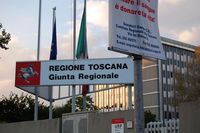On Friday, March 28, 2025, an important conference will be held at the Baronesa Irene Alfano Montecuccoli Visitor Center in Larciano, Pistoia, addressing the conservation status of roe deer in Tuscany. Organized by Federcaccia Toscana-UCT in collaboration with the Pistoia Provincial Section, the conference aims to open a dialogue about the future management of this species.
The event promises participation from qualified speakers and guests, all focused on engaging in a meaningful discussion about conservation efforts needed for roe deer throughout Tuscany.
Franco Biagini, President of the Pistoia Province, has taken charge as the coordinator of this initiative. It aims to review the current conservation status and explore potential management options to ensure the long-term viability of the roe deer population. Following a series of detailed reports and in-depth discussions, Marco Salvadori, President of Fidc-Uct from Tuscany, will provide a summary of the association's position and proposals for effective management strategies.
This gathering comes at a pivotal time when the need for a comprehensive wildlife management plan has never been more pressing. As Salvadori reflects on the challenges facing wildlife conservation, he underscores the urgency for legislative action: "A measure awaited for over ten years," he stated, noting the complications posed by the recent postponement of the Regional Wildlife Hunting Plan.
The Regional Council has decided to again delay the approval of this long-anticipated plan, a decision that Salvadori has criticized when addressing the audience at previous events. He remarked on the need to fill a significant gap that hinders the proper management of wildlife and the environment, emphasizing a shift from previously outdated provincial plans to more effective regional strategies.
"We cannot understand the reasons for these subsequent delays by the majority of the regional government, especially considering the complex and articulated process required for the final approval of the document by the Regional Council," Salvadori stated. His remarks reflect frustration among local hunting associations and advocates for wildlife management, who feel the setbacks are unwarranted.
Moreover, the ongoing delays in the approval process have raised concerns over the implications for wildlife management strategies across Tuscany. Salvadori pointed out that as proposals have long been presented in a spirit of collaboration and constructive discussion, the lack of movement on key topics reflects poorly on the political will within the Regional Council.
In a statement expressing hope for swift action, Salvadori said, "We hope to encourage the Council to expedite the process without further delays, including the fast-track approval of the regional hunting calendar, which also remains pending." His remarks signal the intrinsic link between timely management plans and the rights of hunters, as well as the broader implications for the conservation ecosystem.
This conference, therefore, not only serves as a platform for discussing roe deer conservation but also highlights urgent issues surrounding legislative processes that directly impact wildlife management efforts in Tuscany. The event offers a chance for stakeholders to regroup and address the pressing need for new policies that promote sustainable hunting and effective wildlife protection.
As stakeholders gather at this vital conference, it is essential that the discourse leads to actionable outcomes that will ultimately enhance the conservation of roe deer and align with community goals. The challenges of wildlife management require thoughtful approaches and collaborative efforts, all of which will be crucial as the conference unfolds.
In conclusion, this event marks a significant step for conservation efforts in Tuscany, converging expertise and policy discussions towards a shared vision for the future of wildlife management.





